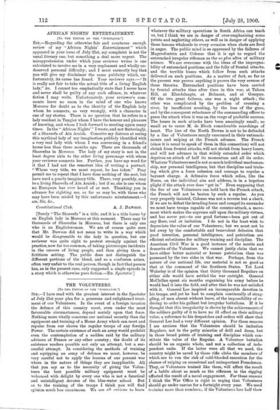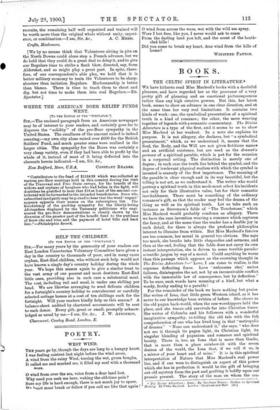THE VOLUNTEERS.
[To THE EDITOR OF THE "SPECTATOR."]
have read with the greatest interest in the Spectator of July 21st your plea for a generous and enlightened treat- ment of our Volunteers. In the event of a foreign invasion the defence of this country must, even under the most favourable circumstances, depend mainly upon that force. Nothing more vitally concerns our national security than the equipment and training of a Home Army which can meet and repulse from our shores the regular troops of any foreign Power. The certain existence of such an army would prohibit even the contemplation of a sudden raid by the military advisers of France or any other country ; the doubt of its existence renders possible not only an attempt, but a suc- cessful attempt. In considering the methods of training and equipping an army of defence we must, however, be very careful not to apply the lessons of our present war where in the nature of things they are inapplicable. All that you say as to the necessity of giving the Volun- teers the best possible military equipment must be welcomed with delight by every one who is not a fanatical and unintelligent devotee of the blue-water school. But as to the training of the troops I think yOu will find opinion much less unanimous. We are all Anxious to learn whatever. the military operations in South Africa can teach us, buti think we are in danger of over-emphasising sOme points and neglecting others, as well as in danger of applying those lessons wholesale to every occasion when shots are fired in anger. The public mind is so oppressed by the failures of Magersfontein and Colenso that it is apt to regard the entrenched irregular rifleman as the ne plus ultra of military science. We are overcome witit the ideas of the impregna- bility of entrenched positions and the folly of frontal attacks, and the terrible losses which follow from such attacks delivered on such positions. As a matter of fact, so fax as the present war proves anything it 'proves the very reverse of these theories. Entrenched positions have been carried by frontal attacks time after time in this war, at Talana Hill, at Elandslaagte, at Belmont, and at • Graspan. Of the two great failures, one was a night attack; the other was complicated by the problem of crossing a river, by insufficient scouting, by the loss of the guns, and by the consequent reluctance of the commanding officer to press the attack when it was on the verge of probable success. The losses in such at tacks have been amazingly small ; so small as to cause M. de Bloch considerable searchings of heart. The line of the North Downs is not to be defended by a line of Volunteers snugly ensconced in their entrench- ments and •sniPing at the French advance. The French (since it is usual to speak of them in this connection) will not shrink from frontal attacks, will not shrink from heavy losses, and will not advance in that widely extended order which deprives an attack of half its momentum and all its order. What our Volunteers needis not so much individual marksman- ship, nor personal intelligence, but that discipline and train- ing which give a force cohesion and courage to repulse a bayonet charge. A defensive force which relies, like the Boers, on the individual aim and address, is in a hopeless plight if the attack ever does "get in." Even supposing that the fire of our Volunteers can hold back the French attack, the French will not be beaten by such a repulse. As you very properly insisted, Colenso was not a reverse but a check. If we are to defeat the invading force and compel its surrender we must have troops capable of the counter-attack, a move- ment which makes the supreme call upon the military virtues, and has never yet—to our good fortune—been got out of any Boer, real or imitation. I do not in the least wish to depreciate the value of our Volunteers; but we must not be led away by the comfortable and benevolent delusion that good intention, personal intelligence, and patriotism are efficient substitutes for military training and discipline. The American Civil War is a good instance of the merits and demerits of the Volunteer. We cannot justly claim that we have either better material or keener patriotism than was possessed by the two sides in that war. Perhaps, from the nature of our national life, our material is not so good as that at the command of the Southern States. Yet Lord Wolseley is of the opinion that thirty thousand Regulars on either side would have settled the war outright. General McClellan spent six months organising his army before he would lead it into the field, and after that he was not satisfied with it. General Lee inspired an incomparable devotion in his troops, and yet he had to complain continually of strag- gling, of men absent without leave, of the impossibility of re- ducing to order his gallant but irregular battalions. If it be thought that this irregularity is shown by the achievements of the soldiers guilty of it to have no ill effect on their military value, a reference to his despatches and orders will show that General Lee had a very different opinion. For these reasons I am anxious that the Volunteers should be imitation Regulars, not in the petty minutia) of drill and dress, but in those broad points of training and discipline which con- stitute the value of the Regular. A Volunteer battalion should be an organic whole, and not a collection of inde- pendent units. If the latter were all that we need, the country might be saved by those rifle clubs the members of which are to run the risk of cold-blooded execution for the chance of sniping an occasional and unimportant Frenchman. They, or Volunteers trained like them, will affect the result of a battle about as much as the riflemen in the rigging affected the result of a naval engagement. For these reasons I think the War Office is right in urging that Volunteers should go under canvas for a fortnight every year. We need training more than numbers; if the Volunteers lose half their
recruits, the remaining half well organised and trained will be worth more than the original whole without unity, experi- ence, or combination.—I am, Sir, &c., A. C. MEDD.
Crofts, Haslemere.
[We by no means think that Volunteers sitting in pits on the North Downs could alone stop a French advance, but we do hold that they could do a great deal to delay it, and to give our Regulars time to strike a flank blow, directed, say, from Aldershot, and so might play a great part. In spite, there- fore, of our correspondent's able plea, we hold that it is better military economy to train the Volunteers to be sharp- shooters than imitation Rekulars. Marksmanship is better than blanco. There is time to teach them to shoot and dig, but not time to make them into real Regulars.—En. Spectator.]



































 Previous page
Previous page